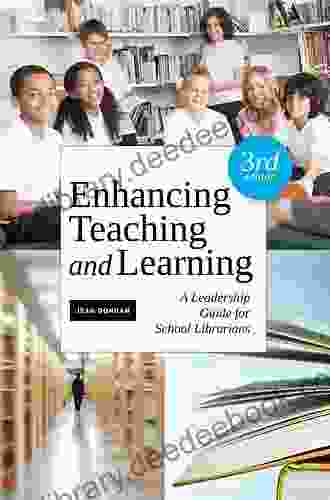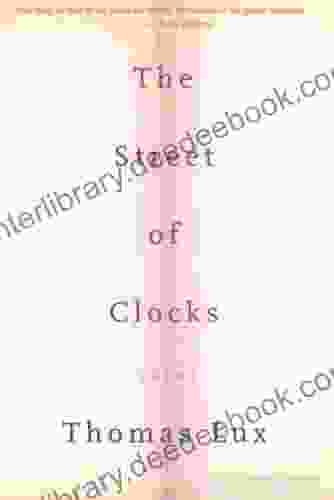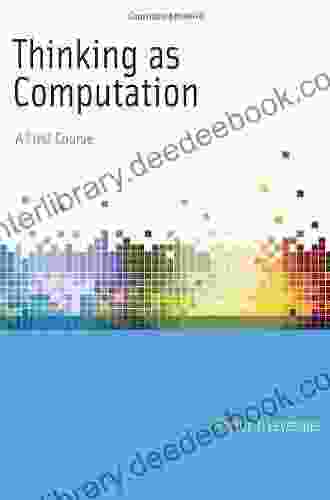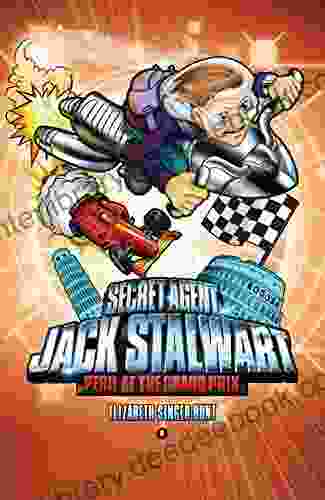Thinking As Computation: A Comprehensive Introduction to Computational Thinking

In the rapidly evolving digital age, computational thinking has emerged as a critical skill for individuals of all ages and backgrounds. Computational thinking empowers us to solve complex problems, innovate new solutions, and make informed decisions in a world increasingly shaped by technology.
4.6 out of 5
| Language | : | English |
| File size | : | 4900 KB |
| Text-to-Speech | : | Enabled |
| Screen Reader | : | Supported |
| Enhanced typesetting | : | Enabled |
| Print length | : | 322 pages |
This article provides a comprehensive to computational thinking, exploring its key concepts, benefits, and applications. We will also discuss strategies for developing computational thinking skills, empowering individuals to become effective problem-solvers and innovators in the 21st century.
What is Computational Thinking?
Computational thinking is a problem-solving approach that draws inspiration from the principles of computer science. It involves breaking down complex problems into smaller, manageable steps, representing problems in a way that computers can understand, and developing algorithms and data structures to solve these problems efficiently.
Computational thinking is not just about learning to code or program. It is a broader mindset that emphasizes critical thinking, problem-solving, creativity, and collaboration. It is a skill that can be applied to a wide range of disciplines, from science and engineering to business and the arts.
Key Concepts of Computational Thinking
- **Decomposition:** Breaking down a problem into smaller, more manageable parts.
- **Pattern Recognition:** Identifying patterns and relationships within data and information.
- **Abstraction:** Creating simplified representations of complex problems.
- **Algorithm Design:** Developing step-by-step instructions for solving problems.
- **Data Structures:** Organizing and storing data in an efficient and accessible manner.
- **Evaluation:** Assessing the effectiveness and efficiency of computational solutions.
Benefits of Computational Thinking
Developing computational thinking skills offers numerous benefits, including:
- Enhanced problem-solving abilities
- Improved analytical and critical thinking skills
- Greater proficiency in technology and digital tools
- Preparation for careers in STEM and other technology-related fields
li>Increased creativity and innovation
Applications of Computational Thinking
Computational thinking finds applications in a wide range of fields, including:
- **Computer Science:** Developing software, algorithms, and data structures
- **Engineering:** Designing and building complex systems
- **Business:** Analyzing data, making informed decisions, and automating processes
- **Science:** Modeling and simulating physical phenomena
- **Medicine:** Analyzing medical data, diagnosing diseases, and developing new treatments
- **Education:** Creating interactive learning experiences, fostering critical thinking
Developing Computational Thinking Skills
Developing computational thinking skills requires a combination of practice, exposure to computational concepts, and guidance from educators and mentors. Here are some strategies for fostering computational thinking in individuals:
- **Engage in coding and programming activities:
- **Participate in computational thinking challenges:
- **Study computer science concepts:** Courses and workshops in computer science provide a deeper understanding of computational principles and techniques.
- **Apply computational thinking to real-world problems:
- **Collaborate with others:
Learning to code provides hands-on experience with computational concepts and problem-solving.
Online platforms and competitions offer challenges that test and develop computational thinking skills.
Try to identify and solve problems in your daily life or academic work using computational thinking approaches.
Working with peers and mentors can foster creativity, problem-solving, and critical thinking.
Computational thinking is an essential skill for navigating the complexities of the modern world. By embracing computational thinking principles, we empower ourselves to become effective problem-solvers, innovators, and critical thinkers. Whether you are a student, a professional, or an aspiring entrepreneur, developing computational thinking skills will provide you with a competitive edge in an increasingly technology-driven society.
As technology continues to transform our lives, computational thinking will become even more crucial for success. Embracing this mindset will enable us to harness the power of computation to solve challenges, create new opportunities, and shape a better future for ourselves and generations to come.
4.6 out of 5
| Language | : | English |
| File size | : | 4900 KB |
| Text-to-Speech | : | Enabled |
| Screen Reader | : | Supported |
| Enhanced typesetting | : | Enabled |
| Print length | : | 322 pages |
Do you want to contribute by writing guest posts on this blog?
Please contact us and send us a resume of previous articles that you have written.
 Book
Book Page
Page Chapter
Chapter Text
Text Genre
Genre Magazine
Magazine Paragraph
Paragraph Sentence
Sentence Bookmark
Bookmark Shelf
Shelf Bibliography
Bibliography Annotation
Annotation Footnote
Footnote Scroll
Scroll Codex
Codex Bestseller
Bestseller Classics
Classics Memoir
Memoir Reference
Reference Dictionary
Dictionary Thesaurus
Thesaurus Resolution
Resolution Librarian
Librarian Catalog
Catalog Borrowing
Borrowing Stacks
Stacks Archives
Archives Periodicals
Periodicals Study
Study Lending
Lending Reserve
Reserve Journals
Journals Rare Books
Rare Books Interlibrary
Interlibrary Thesis
Thesis Dissertation
Dissertation Storytelling
Storytelling Awards
Awards Theory
Theory Textbooks
Textbooks Jeffrey Yang
Jeffrey Yang Creative Sounds Academy
Creative Sounds Academy Betsy L Jordan
Betsy L Jordan Christine Mulcahey
Christine Mulcahey Elle Thorpe
Elle Thorpe Erica Stewart
Erica Stewart Nick Rennison
Nick Rennison Valerie Tripp
Valerie Tripp Rocky Ferrenburg
Rocky Ferrenburg Kevin J Hayes
Kevin J Hayes Conrad Bauer
Conrad Bauer Fiona Stapley
Fiona Stapley Travis Brant
Travis Brant Tyne Daile Sumner
Tyne Daile Sumner Christopher Marsh
Christopher Marsh Thomas Keneally
Thomas Keneally Todd Scott Parker
Todd Scott Parker Rachel Secor
Rachel Secor Sally Putnam Chapman
Sally Putnam Chapman Marilyn Cohen De Villiers
Marilyn Cohen De Villiers
Light bulbAdvertise smarter! Our strategic ad space ensures maximum exposure. Reserve your spot today!

 Charles ReedSolo Violin Arrangements by Leopold Auer: A Comprehensive Analysis and Guide...
Charles ReedSolo Violin Arrangements by Leopold Auer: A Comprehensive Analysis and Guide...
 Adam HayesJames Goes to the Farm: A Review of a Children's Book that Teaches the Value...
Adam HayesJames Goes to the Farm: A Review of a Children's Book that Teaches the Value...
 Julio Ramón RibeyroThe Grieving Student Guide for Schools: Supporting Bereavement in the...
Julio Ramón RibeyroThe Grieving Student Guide for Schools: Supporting Bereavement in the... Pete BlairFollow ·13.3k
Pete BlairFollow ·13.3k Connor MitchellFollow ·6.4k
Connor MitchellFollow ·6.4k James GrayFollow ·15.1k
James GrayFollow ·15.1k Craig CarterFollow ·12.2k
Craig CarterFollow ·12.2k Charles DickensFollow ·8.7k
Charles DickensFollow ·8.7k Fletcher MitchellFollow ·2.6k
Fletcher MitchellFollow ·2.6k Haruki MurakamiFollow ·10.9k
Haruki MurakamiFollow ·10.9k Leo MitchellFollow ·6.4k
Leo MitchellFollow ·6.4k

 Bo Cox
Bo CoxDiscover the Enchanting Allure of Collingwood, Ontario,...
Nestled amidst the breathtaking landscape of...

 Ralph Ellison
Ralph EllisonThe Street of Clocks Poems: A Poetic Journey Through Time
Welcome to The Street...

 Dwight Blair
Dwight BlairCritical Political Economy of the Middle East and North...
The Middle East and...

 Deion Simmons
Deion SimmonsPerfect Strategies For Painting Amazing Marine Creatures...
Gouache is a...

 Hugh Bell
Hugh BellThe American Republic: Constitution, Tendencies, and...
The American Republic,...
4.6 out of 5
| Language | : | English |
| File size | : | 4900 KB |
| Text-to-Speech | : | Enabled |
| Screen Reader | : | Supported |
| Enhanced typesetting | : | Enabled |
| Print length | : | 322 pages |








